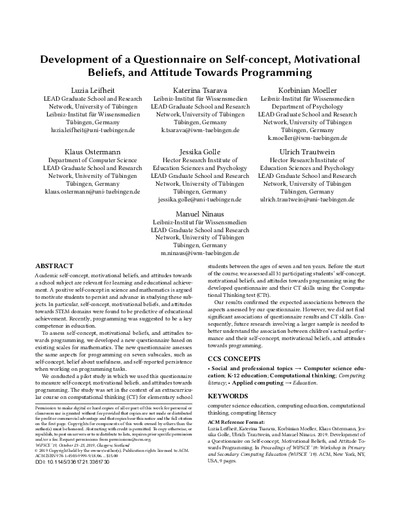 Diese Seite wurde seit 3 Jahren inhaltlich nicht mehr aktualisiert.
Unter Umständen ist sie nicht mehr aktuell.
Diese Seite wurde seit 3 Jahren inhaltlich nicht mehr aktualisiert.
Unter Umständen ist sie nicht mehr aktuell.
 Zusammenfassungen
Zusammenfassungen

Academic self-concept, motivational beliefs, and attitudes towards a school subject are relevant for learning and educational achievement. A positive self-concept in science and mathematics is argued to motivate students to persist and advance in studying these subjects. In particular, self-concept, motivational beliefs, and attitudes towards STEM domains were found to be predictive of educational achievement. Recently, programming was suggested to be a key competence in education.
To assess self-concept, motivational beliefs, and attitudes towards programming, we developed a new questionnaire based on existing scales for mathematics. The new questionnaire assesses the same aspects for programming on seven subscales, such as self-concept, belief about usefulness, and self-reported persistence when working on programming tasks.
We conducted a pilot study in which we used this questionnaire to measure self-concept, motivational beliefs, and attitudes towards programming. The study was set in the context of an extracurricular course on computational thinking (CT) for elementary school students between the ages of seven and ten years. Before the start of the course, we assessed all 31 participating students' self-concept, motivational beliefs, and attitudes towards programming using the developed questionnaire and their CT skills using the Computational Thinking test (CTt).
Our results confirmed the expected associations between the aspects assessed by our questionnaire. However, we did not find significant associations of questionnaire results and CT skills. Consequently, future research involving a larger sample is needed to better understand the association between children's actual performance and their self-concept, motivational beliefs, and attitudes towards programming.
 Dieses Konferenz-Paper erwähnt ...
Dieses Konferenz-Paper erwähnt ...
 Personen KB IB clear | Ruth E. Anderson , Jodi Asbell-Clarke , Peter Denning , Brian Dorn , Allison Elliott Tew , Jessika Golle , Luzia Leifheit , Colleen M. Lewis , Korbinian Moeller , Sepehr Hejazi Moghadam , Enrico Nardelli , Manuel Ninaus , Seymour Papert , Marcos Román-González , Oliver S. Schneider , Valerie J. Shute , Chen Sun , Matti Tedre , Juliet Tiffany-Morales , Ulrich Trautwein , Katerina Tsarava , Martin V. Butz , Jennifer Wang , Jeannette M. Wing , Ken Yasuhara , Pat Yongpradit | ||||||||||||||||||||||||||||||||||||||||||||||||||||||||||||||||||||||||||||||||||||||||||
 Begriffe KB IB clear | computational thinkingcomputational thinking
, Informatikcomputer science
,  Mathematik Mathematik mathematics
, mathematics
,  MINT MINT science, technology, engineering, mathematics
, science, technology, engineering, mathematics
,  Motivation Motivation motivation
, motivation
,  Programmieren Programmieren programming programming
| ||||||||||||||||||||||||||||||||||||||||||||||||||||||||||||||||||||||||||||||||||||||||||
 Bücher |
| ||||||||||||||||||||||||||||||||||||||||||||||||||||||||||||||||||||||||||||||||||||||||||
 Texte |
|
 Dieses Konferenz-Paper erwähnt vermutlich nicht ...
Dieses Konferenz-Paper erwähnt vermutlich nicht ... 
 Nicht erwähnte Begriffe | Informatik-Didaktik, Informatik-Unterricht (Fachinformatik) |
 Tagcloud
Tagcloud
 Zitationsgraph
Zitationsgraph
 Zitationsgraph (Beta-Test mit vis.js)
Zitationsgraph (Beta-Test mit vis.js)
 Zeitleiste
Zeitleiste
 1 Erwähnungen
1 Erwähnungen 
- WiPSCE '20 - Workshop in Primary and Secondary Computing Education, Virtual Event, Germany, October 28-30, 2020 (Torsten Brinda, Michal Armoni) (2020)
- Programming in primary education - towards a research based assessment framework (Linda Mannila, Fredrik Heintz, Susanne Kjällander, Anna Åkerfeldt) (2020)


- Programming in primary education - towards a research based assessment framework (Linda Mannila, Fredrik Heintz, Susanne Kjällander, Anna Åkerfeldt) (2020)
 Anderswo finden
Anderswo finden
 Volltext dieses Dokuments
Volltext dieses Dokuments
 |  Development of a Questionnaire on Self-concept, Motivational Beliefs, and Attitude Towards Programming: Artikel als Volltext ( Development of a Questionnaire on Self-concept, Motivational Beliefs, and Attitude Towards Programming: Artikel als Volltext ( : :  , 923 kByte; , 923 kByte;  : :  ) ) |
 Anderswo suchen
Anderswo suchen 
 Beat und dieses Konferenz-Paper
Beat und dieses Konferenz-Paper
Beat hat Dieses Konferenz-Paper während seiner Zeit am Institut für Medien und Schule (IMS) ins Biblionetz aufgenommen. Er hat Dieses Konferenz-Paper einmalig erfasst und bisher nicht mehr bearbeitet. Beat besitzt kein physisches, aber ein digitales Exemplar. Eine digitale Version ist auf dem Internet verfügbar (s.o.). Es gibt bisher nur wenige Objekte im Biblionetz, die dieses Werk zitieren.




















 Biblionetz-History
Biblionetz-History